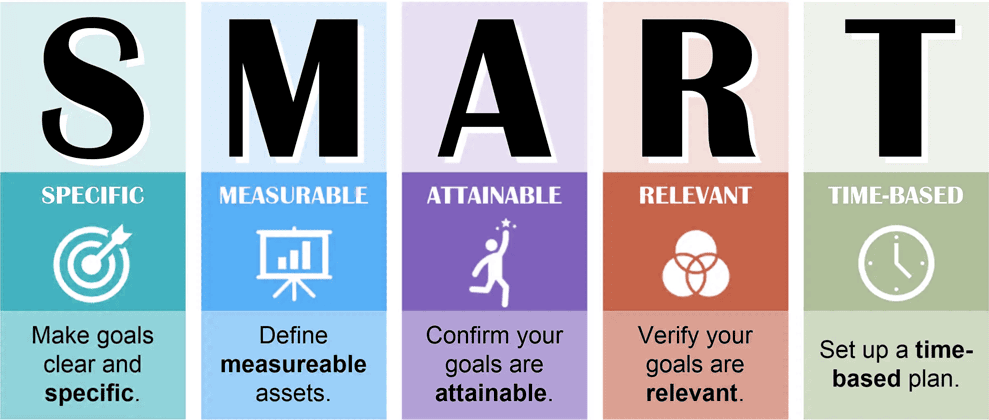SMART Goals are a powerful tool in the world of goal setting, providing a clear and effective framework to help individuals and organizations achieve their objectives. The acronym SMART stands for Specific, Measurable, Achievable, Relevant, and Time-bound. This strategic approach utilizes your own psychology to ensure your goals are crystal clear and can be realistically attained within a specified timeframe.

The act of setting goals is a fundamental component of personal development and success. It gives individuals a sense of direction, serving as a roadmap guiding their actions and decisions. Without well-defined goals, it's easy to drift aimlessly, lacking purpose and motivation. Goal-setting also provides a mechanism for self-reflection, enabling us to recognize our strengths and weaknesses, and ultimately promoting self-improvement.
Whether you're aiming to develop a new skill, save for a big purchase, or enhance your professional career, goal setting is the first step towards reaching these ambitions. However, merely outlining a goal often isn't enough. This is where SMART goals come in.
SMART Acronym Explained
Specific
The first principle of SMART goal setting is specificity. A specific goal precisely defines what you want to achieve, leaving no room for ambiguity. Rather than setting a goal to "get fit," a specific goal would be "to run a 5K race." By being specific, you clarify where to focus your efforts and establish a clear direction to follow.
This makes it easier to stay motivated and committed throughout your journey towards goal achievement. It also makes it easier to make decisions that revolves around your goal.
Measurable
Measurable goals have tangible evidence that you've accomplished the goal. This usually means a number is involved in the goal setting process. Numbers allow you to track progress and determine when the goal has been met. For example, if your goal is to save money, a measurable goal might be "to save $5000 in a year."
By setting a precise figure, you can gauge your progress and make necessary adjustments to your saving strategy. Measurable goals provide motivation and foster a sense of achievement when they are reached.
"What gets measured, gets managed." - Peter Drucker
Achievable
While it's important to set goals that challenge you, they should also be achievable. Goals that are too lofty can lead to disappointment and a feeling of failure.
A SMART goal considers your available resources, skills, and abilities. It should inspire you to stretch your abilities, but not so far that it's out of reach. An achievable goal for someone who has never run before might be "to run a mile without stopping within two months," rather than "to run a marathon in one month."
Relevant
Relevant goals align with your broader objectives and values. They're meaningful to you and play a part in your overarching plan for life or business. For instance, if you value physical health and well-being, a relevant goal might be "to incorporate a half-hour exercise routine into your daily schedule." Relevance in goal setting ensures that you're moving in the direction that is most important to you.
Time-bound
Lastly, SMART goals are time-bound, meaning they have a clear start and end date. This creates a sense of urgency and prompts action.
For a goal to be time-bound, you need to specify by when you intend to achieve it. "Lose 10 pounds" is vague, but "lose 10 pounds in 10 weeks" provides a clear timeline. This time constraint helps you stay focused and motivated, as it offers a clear deadline for achieving your goal.
By setting a deadline on your goal, you can also clearly know if you accomplish your goal or not.
Why Use SMART Goals?

SMART goals offer a practical system for setting and achieving goals that go beyond the generic ambitions many of us are familiar with. By requiring specificity, measurability, attainability, relevance, and a time frame, SMART goals compel us to think through our desires carefully, plan strategically, and align our efforts efficiently. These criteria help to eliminate vagueness and indecision, paving the way for meaningful action towards goal fulfillment.
From personal fitness to financial planning, academic achievements to career progression, SMART goals can be employed in virtually any area of life. They provide a proven framework for success, encouraging individuals to take ownership of their goals, monitor their progress, and celebrate their accomplishments.
Through the remainder of this article, we will dive deeper into the SMART goal-setting process, discuss its benefits, and provide numerous examples across diverse scenarios.
The Psychology Behind Smart Goals
SMART goals leverage the psychological principles of self-efficacy and self-regulation, boosting motivation and achievement.
Specific and measurable aspects of SMART goals provide a clear vision of success, bolstering one's belief in their capabilities. According to the goal-setting theory developed by psychologists Edwin A. Locke and Gary P. Latham, clear and specific goals lead to better task performance than vague or easy goals.
The achievable aspect enhances the sense of self-efficacy as individuals see their ability to reach their goals. According to the Self-Efficacy Theory by psychologist Albert Bandura, individuals who believe they have the skills and capabilities to achieve a goal are more likely to persist in the face of challenges and ultimately achieve those goals.
Relevance ensures the goal is personally meaningful, which increases intrinsic motivation, and being time-bound creates a sense of urgency, promoting immediate action.
The SMART methodology brings several key advantages over traditional goal setting. First, it removes ambiguity, ensuring you know precisely what you're working towards.
Second, the structure of SMART goals facilitates regular tracking and adjustment, promoting agility in the face of change.
Lastly, SMART goals tend to create a deeper sense of commitment and ownership, leading to higher levels of engagement and effort.
Other Goal-Setting Techniques

While there are other goal-setting techniques such as CLEAR (Collaborative, Limited, Emotional, Appreciable, Refinable) or HARD (Heartfelt, Animated, Required, Difficult), SMART goals offer a unique blend of criteria that ensure goals are precise and actionable.
CLEAR Goals:
- Collaborative - Goals should encourage employees to work together collaboratively. The aim is to leverage the strength of the team to achieve the set goals more effectively.
- Limited - Goals should be limited in both scope and duration. This helps to maintain focus and avoid the dilution of efforts across too many objectives.
- Emotional - Goals should connect to the emotional drives of the individuals working on them. This enhances motivation and commitment to the goal.
- Appreciable - Large goals should be broken down into smaller, manageable tasks. This makes the goal more appreciable and easier to approach.
- Refinable - Goals should be flexible and adaptable to change. As new situations arise, goals should be refined and adjusted accordingly.
HARD Goals:
- Heartfelt - Goals should be connected to your intrinsic interests, passions, and values. They should be something you naturally care about and are willing to strive for.
- Animated - Goals should be able to be visualized. This means you should be able to imagine what the outcome of the goal looks like, how it feels, and how it will impact your life or work.
- Required - Goals should feel necessary. They should align with broader life or business objectives and be something you believe must be achieved.
- Difficult - Goals should be challenging. They should push you outside of your comfort zone and force you to grow and develop in your pursuit of achieving them.
Other techniques might focus more on emotional connection, collaboration, or continual refinement. However, these methodologies often overlap in many aspects with SMART goals, emphasizing specificity, measurability, and having time constraints.
Detailed SMART Goals Breakdown
SMART Goals for Weight Loss:

"I aim to lose 15 pounds by working out for at least 30 minutes a day, five days a week, and maintaining a balanced diet over the next three months to improve my health and self-esteem."
- Specific: I want to lose weight.
- Measurable: I aim to lose 15 pounds.
- Achievable: I will work out for at least 30 minutes a day, five days a week, and maintain a balanced diet.
- Relevant: This will improve my health and self-esteem.
- Time-bound: I want to achieve this in the next three months.
"I aim to run a full 5K without stopping by training three times per week and gradually increasing my distance over the next six months to improve my overall health and stamina."
- Specific: I want to improve my cardiovascular health.
- Measurable: I aim to run a full 5K without stopping.
- Achievable: I will train by running three times per week, gradually increasing my distance.
- Relevant: This will improve my overall health and stamina.
- Time-bound: I aim to achieve this within the next six months.
"I aim to reduce my body fat by 5% by incorporating strength training into my routine three times per week and adjusting my diet over the next four months to improve my muscle tone and overall fitness."
- Specific: I want to decrease my body fat percentage.
- Measurable: I aim to reduce my body fat by 5%.
- Achievable: I will incorporate strength training into my routine three times per week and adjust my diet.
- Relevant: This will improve my muscle tone and overall fitness.
- Time-bound: I aim to achieve this in the next four months.
SMART Goals for Students:

"I aim to raise my math grade from a B to an A by attending extra study sessions and completing all homework assignments by the end of this semester to maintain a high GPA."
- Specific: I want to improve my grade in math.
- Measurable: I aim to raise my grade from a B to an A.
- Achievable: I will attend extra study sessions and complete all homework assignments. Relevant: This will help me to maintain a high GPA.
- Time-bound: I aim to achieve this by the end of the semester.
"I aim to confidently deliver a five-minute speech by joining the debate club to practice public speaking regularly over the next two months to enhance my communication skills and confidence."
- Specific: I want to become better at public speaking.
- Measurable: I aim to deliver a five-minute speech confidently.
- Achievable: I will join the debate club to practice public speaking regularly.
- Relevant: This will enhance my communication skills and confidence.
- Time-bound: I aim to achieve this in the next two months.
"I aim to read 12 books by setting aside an hour every night for reading over the next year to improve my vocabulary and comprehension skills."
- Specific: I want to read more books.
- Measurable: I aim to read 12 books.
- Achievable: I will set aside an hour every night for reading.
- Relevant: This will improve my vocabulary and comprehension skills.
- Time-bound: I aim to achieve this within one year.
SMART Goals for Saving Money:

"I aim to save $20,000 for a down payment on a house by setting aside 15% of my paycheck each month over the next three years to move closer to becoming a homeowner."
- Specific: I want to save money for a down payment on a house.
- Measurable: I aim to save $20,000.
- Achievable: I will set aside 15% of my paycheck each month.
- Relevant: This will move me closer to becoming a homeowner.
- Time-bound: I aim to achieve this in three years.
"I aim to reduce my spending on non-essential items by $100 each month by tracking my expenses daily and limiting eating out to once a week over the next year to save more money each month."
- Specific: I want to reduce my spending on non-essential items.
- Measurable: I aim to reduce my spending by $100 each month.
- Achievable: I will track my expenses daily and limit eating out to once a week.
- Relevant: This will help me save more money each month.
- Time-bound: I aim to start this coming month and maintain it for a year.
"I aim to save $3,000 in my emergency fund by depositing $250 into my savings account each month over the next year to ensure financial security in case of unexpected expenses."
- Specific: I want to create an emergency fund.
- Measurable: I aim to save $3,000 in my emergency fund.
- Achievable: I will deposit $250 into my savings account each month.
- Relevant: This will ensure financial security in case of unexpected expenses.
- Time-bound: I aim to achieve this in one year.
Now that we've diagnosed what it takes to come up with a SMART goal, let's get onto a larger list of one-liners that satisfy all the requirements!
70+ SMART Goal Examples

- "I aim to finish a 10,000-word novel by writing 500 words a day over the next 20 days to improve my writing skills."
- "I plan to learn conversational French by taking weekly lessons and practicing daily over the next six months to prepare for my trip to France."
- "I aim to reduce my screen time by 30 minutes each day over the next month to improve my sleep quality and mental health."
- "I plan to read 50 pages of a book every day for the next month to increase my reading speed."
- "I aim to increase my typing speed to 60 words per minute by practicing for 15 minutes each day over the next two months to improve my productivity."
- "I plan to complete a full marathon by training five days a week over the next six months to enhance my physical fitness."
- "I aim to save $5,000 for a vacation by setting aside $200 from my paycheck every month over the next two years."
- "I plan to reduce my caffeine intake to one cup a day by gradually decreasing consumption over the next month to improve my sleep quality."
- "I aim to improve my presentation skills by delivering a presentation to my team every month over the next year to enhance my leadership capabilities."
- "I plan to learn basic coding in Python by completing an online course over the next three months to broaden my skills set."
- "I aim to obtain a professional certification in my field by studying one hour a day over the next six months to advance my career."
- "I plan to reduce my stress levels by practicing yoga three times a week for the next three months."
- "I aim to finish the online course I signed up for by studying two hours a week for the next two months to add to my professional credentials."
- "I plan to increase my retirement savings by 10% by saving an extra $50 per month over the next year."
- "I aim to master the skill of making homemade pasta by practicing every weekend for the next three months."
- "I plan to decrease my mile run time by 10% by running three times a week for the next three months."
- "I aim to lose 2 inches off my waist by exercising regularly and controlling my diet over the next four months."
- "I plan to increase my social media followers by 20% by posting quality content daily over the next three months."
- "I aim to meditate for 10 minutes every morning for the next 30 days to reduce stress and increase mindfulness."
- "I plan to write and publish a research paper in my field by working on it two hours every week for the next year."
- "I aim to increase my business's customer base by 25% by implementing a new marketing strategy over the next six months."
- "I plan to finish knitting a blanket by knitting for 30 minutes every day for the next three months."
- "I aim to lower my cholesterol level by 10% by eating a healthy diet and exercising regularly over the next six months."
- "I plan to improve my posture by practicing targeted exercises every day for the next two months."
- "I aim to learn basic gardening by reading one gardening article per week and applying the concepts in my backyard over the next two months."
- "I plan to improve my guitar playing skills by taking lessons and practicing for one hour every day over the next six months."
- "I aim to get a promotion at work by improving my work performance and taking on additional responsibilities over the next year."
- "I plan to learn to play three of my favorite songs on the piano by practicing half an hour each day over the next two months."
- "I aim to recycle 50% of my household waste by implementing a waste segregation system over the next month."
- "I plan to improve my listening skills by actively listening and reflecting back in every conversation over the next three months."
- "I aim to build a basic website for my business by learning and applying web development skills over the next six weeks."
- "I plan to read and summarize one industry-relevant article each week for the next six months to stay updated in my field."
- "I aim to improve my credit score by 20 points by making timely payments and reducing debt over the next year."
- "I plan to learn how to cook five new recipes by taking a cooking class and practicing over the next two months."
- "I aim to increase my sales by 15% by reaching out to five potential clients every week for the next quarter."
- "I plan to expand my professional network by attending one industry event each month over the next year."
- "I aim to reduce my monthly grocery expenses by 20% by planning meals and sticking to a list over the next two months."
- "I plan to learn basic Spanish by practicing 15 minutes every day over the next three months to prepare for my vacation."
- "I aim to improve my public speaking skills by joining Toastmasters and giving a speech each month over the next six months."
- "I plan to qualify for the Boston Marathon by training six days a week over the next year."
- "I aim to master advanced Excel functions by completing an online course and practicing over the next two months to enhance my job performance."
- "I plan to decrease my carbon footprint by 10% by using public transportation and reducing waste over the next year."
- "I aim to organize my home by decluttering one room each week over the next two months."
- "I plan to maintain a journal by writing in it for 10 minutes every night for the next month to improve my mental health."
- "I aim to get at least seven hours of sleep every night for the next month to improve my health and productivity."
- "I plan to write a business plan for my startup by working on it for an hour each day over the next month."
- "I aim to reduce late work submissions by planning my tasks and sticking to a schedule over the next semester."
- "I plan to improve my time management skills by using a planner and setting deadlines for tasks over the next month."
- "I aim to learn how to bake bread by following a recipe and practicing every weekend for the next two months."
- "I plan to create a personal budget by tracking my income and expenses over the next month to improve my financial management."
- "I aim to increase customer satisfaction by 10% by implementing a new customer service strategy over the next quarter."
- "I plan to learn basic photography skills by taking a course and practicing over the next three months for my hobby."
- "I aim to reduce my sugar intake by 50% by choosing healthier alternatives and portion control over the next two months."
- "I plan to learn how to swim by taking lessons twice a week over the next three months to improve my fitness."
- "I aim to improve my work-life balance by setting boundaries and taking time off work over the next month."
- "I plan to learn how to make sushi by taking a cooking class and practicing over the next two months."
- "I plan to quit smoking by gradually reducing my cigarette intake over the next six months to improve my health."
- "I aim to volunteer for 50 hours at the local shelter by dedicating one weekend each month for the next year."
- "I plan to improve my project management skills by undertaking a professional course and applying it at work over the next three months."
- "I aim to reduce screen time by 1 hour each day by engaging in reading and outdoor activities over the next two months."
- "I plan to improve my customer service skills by attending a workshop and applying the techniques over the next quarter."
- "I aim to reduce the bounce rate on my website by 10% by improving content and site navigation over the next three months."
- "I plan to drink at least 2 liters of water each day over the next month to improve my hydration and health."
- "I aim to become proficient in Photoshop by watching tutorials and practicing for 1 hour a day over the next two months."
- "I plan to improve my negotiation skills by reading a relevant book and applying techniques in real scenarios over the next two months."
- "I aim to learn how to play chess by taking lessons and practicing every week over the next three months."
- "I plan to walk 10,000 steps every day for the next 30 days to improve my physical health."
- "I aim to write a children's book by drafting one chapter per week over the next three months."
- "I plan to learn sign language by taking an online course over the next six months to improve my communication skills."
- "I aim to learn how to change a tire by watching instructional videos and practicing over the next month."
- "I plan to prepare for my professional licensure exam by studying one topic each week over the next four months."
- "I aim to get a pet by researching and preparing for the responsibilities over the next month."
- "I plan to reduce my energy usage by 10% by turning off appliances when not in use over the next two months."
- "I aim to organize my digital files by setting aside an hour each week to sort and delete over the next two months."
- "I plan to visit a new city by saving $100 per month for travel expenses over the next year."
- "I aim to reduce paper waste by setting up digital billing and record-keeping over the next month."
- "I plan to learn basic car maintenance by taking a course over the next two months to become more self-sufficient."
- "I aim to start a blog on my favorite hobby by posting one article per week over the next three months."
- "I plan to pass my driving test by taking lessons and practicing over the next two months."
- "I aim to plant a vegetable garden by preparing a plot and planting seeds over the next month."
- "I plan to increase my product knowledge by studying one product a day over the next month to improve my sales performance."
- "I aim to start a morning routine by waking up at 6 am and exercising for 30 minutes every day for the next month."
- "I plan to improve my mental math skills by practicing for 15 minutes each day over the next two months."
- "I aim to prepare a five-course meal for my friends by learning and practicing each recipe over the next two months."
- "I plan to reduce my commute time by 20% by finding a more efficient route over the next month."



